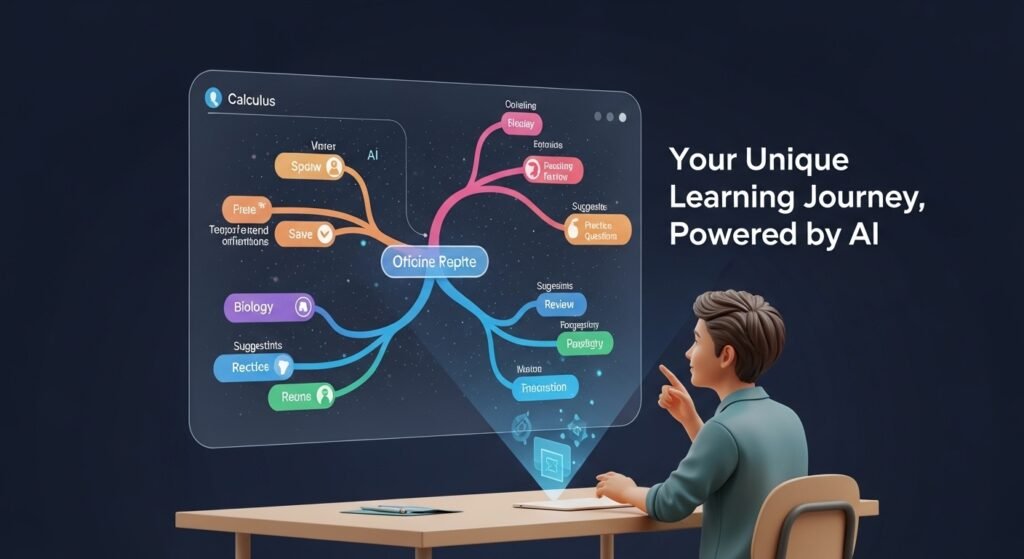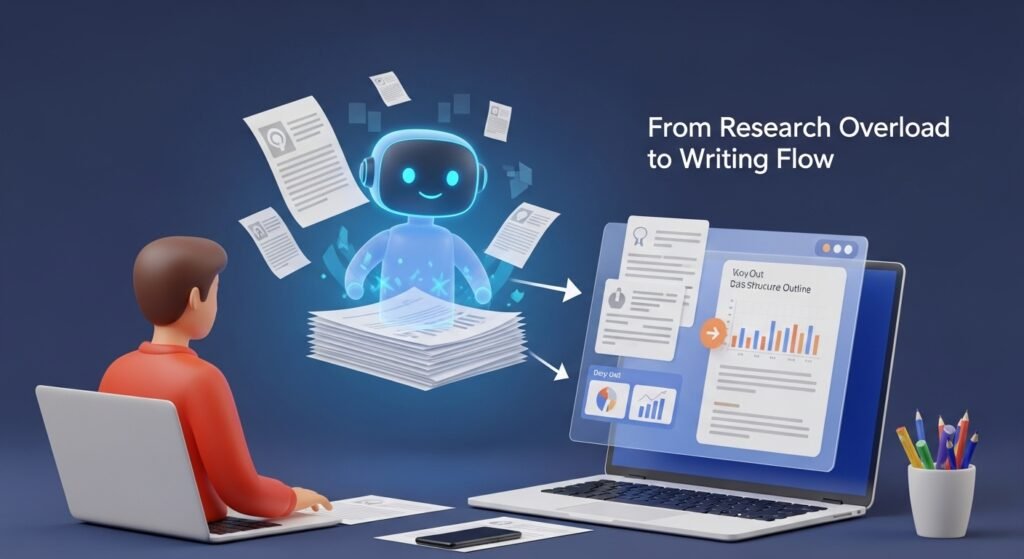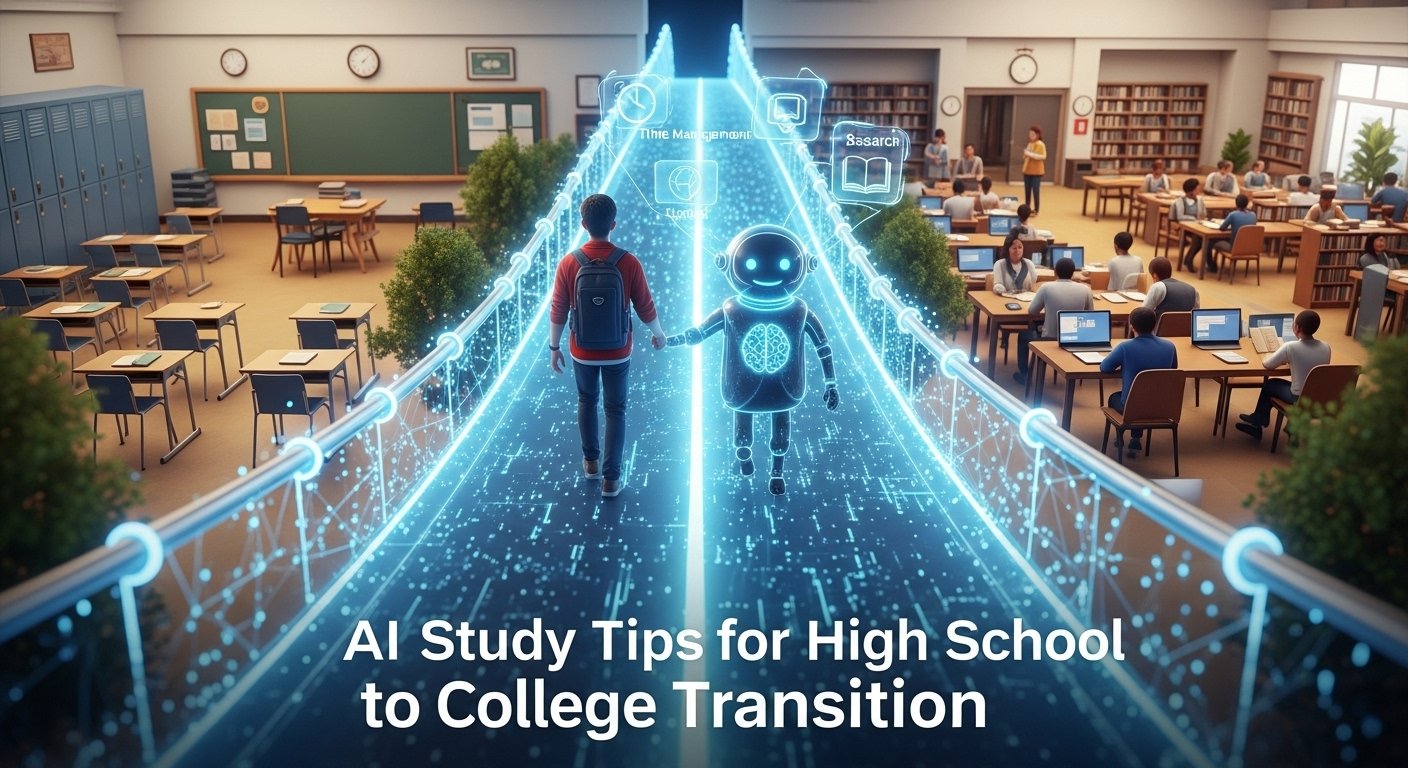Discover how AI in education can ease your transition from high school to college. Get smart study tips, tool recommendations, and strategies for academic success in 2025.
AI Study Tips for High School to College Transition
The leap from high school to college is one of the most exciting—and daunting—transitions in a student’s life. Suddenly, you’re navigating larger classes, more complex material, and greater expectations for independent learning. Remember those all-nighters in high school? They won’t cut it in college. But what if you had a personal academic assistant available 24/7 to help you manage time, understand difficult concepts, and prepare for exams? Thanks to advancements in AI in education, that’s now a reality.
The integration of AI in education is transforming how students learn, study, and succeed. From personalized learning platforms to intelligent tutoring systems, artificial intelligence is helping bridge the gap between high school preparedness and college-level expectations. According to a recent report by Global Market Insights, the educational AI market is expected to exceed $80 billion by 2030, reflecting the growing recognition of its potential to enhance learning outcomes.
For students transitioning to college, AI in education offers particularly powerful benefits. These technologies can help you develop the critical thinking, time management, and self-directed learning skills that are essential for college success. In this article, we’ll explore practical ways to leverage AI in education to make your transition smoother, your studying more effective, and your college experience more successful.
Why the High School to College Transition Is Challenging
Before we dive into AI solutions, it’s important to understand why this transition is so difficult for many students:
- Increased Academic Rigor: College courses move faster and require deeper understanding
- Less Structured Time: You’ll have more free time but need better self-management skills
- Different Assessment Styles: Fewer frequent assignments, more high-stakes exams
- New Learning Environment: Larger classes, less individual attention from professors
This is where AI in education can make a significant difference by providing the personalized support and structure that college freshmen often need.
Applied Scientific Thinking: A Practical Framework for Real-World Problem-Solving
How AI in Education Supports College Transition Success

1. Personalized Learning Paths
The Challenge: College courses assume baseline knowledge that varies significantly among incoming students.
The AI Solution: Adaptive learning platforms use algorithms to identify knowledge gaps and create customized learning paths. These systems continuously assess your understanding and adjust content difficulty accordingly.
Tools to Try:
- Knewton Alta: Provides personalized coursework and real-time feedback
- Cognii: Offers AI-powered virtual tutors for personalized learning experiences
Pro Tip: Use these platforms during the summer before college to brush up on subjects where you might need reinforcement.

2. Smart Time Management and Organization
The Challenge: Managing multiple courses, assignments, and deadlines without the structure of high school.
The AI Solution: AI-powered planners and calendars can analyze your schedule, priorities, and even your energy patterns to optimize your study time.
Tools to Try:
- My Study Life: Intelligent planner that syncs across devices
- Trello with Butler automation: Creates smart workflows for assignment tracking
Pro Tip: Allow these tools to learn from your habits for increasingly accurate scheduling recommendations.

3. Enhanced Research and Writing Support
The Challenge: College-level research and writing requirements are significantly more advanced than high school expectations.
The AI Solution: AI writing assistants can help with everything from brainstorming to citation formatting, while research tools can quickly analyze and synthesize academic sources.
Tools to Try:
- Grammarly: Goes beyond grammar to improve clarity and tone
- Scite.ai: Helps evaluate and contextualize research sources
- Zotero: AI-enhanced citation management
Pro Tip: Use these tools as learning aids rather than crutches—pay attention to the patterns they identify in your writing.
4. Intelligent Exam Preparation
The Challenge: College exams often cover more material and require deeper analysis than high school tests.
The AI Solution: AI-powered study tools can create customized practice tests, identify areas needing review, and even simulate exam conditions.
Tools to Try:
- Quizlet Learn: Creates personalized study plans based on your progress
- ExamSoft: Provides detailed analytics on exam performance
Pro Tip: Start using these tools early in the semester rather than waiting for exam season.
How Metacognitive Routines Build in Middle School ELA
5. Virtual Study Groups and Collaboration
The Challenge: Forming effective study groups can be difficult in large college classes.
The AI Solution: AI platforms can match you with ideal study partners based on learning styles, schedules, and academic strengths.
Tools to Try:
- Brainly: Connects you with peers for collaborative problem-solving
- Microsoft Teams for Education: Uses AI to enhance virtual collaboration
Pro Tip: Use these platforms to build your academic network early in the semester.

Ethical Considerations for Using AI in Education
While AI in education offers tremendous benefits, it’s important to use these tools responsibly:
- Maintain Academic Integrity: Use AI as a learning aid, not a means to bypass understanding
- Protect Your Data: Be mindful of privacy settings when using educational platforms
- Develop Fundamental Skills: Ensure you’re building core competencies rather than over-relying on technology
The best approach is to view AI in education as a supplement to—not a replacement for—your own critical thinking and effort.
Implementing Your AI Study Strategy: A Step-by-Step Guide
- Assess Your Needs: Identify where you need the most support (time management, content mastery, writing, etc.)
- Select Appropriate Tools: Choose 2-3 AI tools that address your specific challenges
- Integrate Gradually: Incorporate one tool at a time into your study routine
- Evaluate Effectiveness: Regularly assess whether each tool is actually improving your learning
- Adjust as Needed: Be willing to switch tools or approaches based on what works best for you
Are Online Degrees Worth It in 2025
The Future of AI in Education
As AI in education continues to evolve, we can expect even more sophisticated support for college students. Emerging technologies like emotion-aware AI (which can detect frustration or confusion) and predictive analytics (which can identify at-risk students before they fall behind) promise to make the transition to college even smoother.
The key is to stay informed about new developments while maintaining focus on your fundamental learning goals. AI in education should enhance your education, not define it.
How to Start Online Tutoring in 2025 — Earn from Home
Conclusion: Embracing AI for Academic Success
The transition from high school to college doesn’t have to be a struggle. By strategically leveraging AI in education, you can develop the skills, habits, and confidence needed to thrive in your college career. These technologies offer personalized support that can help bridge the gap between high school and college-level expectations.
Remember that AI in education works best when combined with your own effort and engagement. Use these tools to enhance your understanding, manage your time more effectively, and demonstrate your full academic potential. With the right approach, you can turn the challenge of transition into an opportunity for growth.
What’s your biggest concern about transitioning to college? Share your thoughts in the comments below, and let us know which AI study tools you’re excited to try! For more tips on college success, check out our How to Start Online Tutoring in 2025 — Earn from Home




Pingback: VR Geology: Volcanoes and Earthquakes Basics - PaidScripts -Tech Education Hub: Courses & Student Resources
Pingback: SEL Character Building and Curiosity in Kids - PaidScripts -Tech Education Hub: Courses & Student Resources